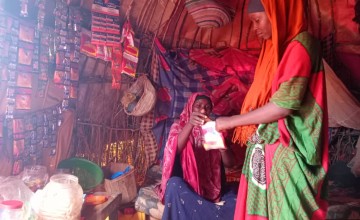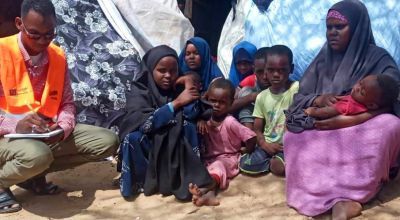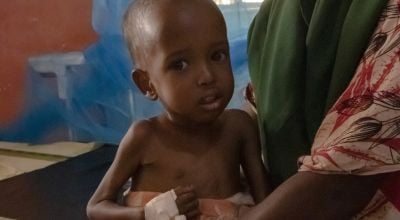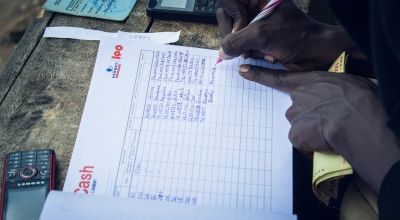
Read our 2023 annual report

Knowledge Hub
“To run away from home, in the middle of conflict, with your young kids, and just the basics you can carry, is inconceivable.”
Aqila is sitting inside a patchwork tent; sheets of cloth tied together over a tree branch frame. The ground is orange clay, dried out by the most severe drought Somalia has seen for 60 years.
Surrounding her are her seven children, ranging in age from 13 years to six months, sheltering from the incessant sun.
“A hungry person cannot see right or wrong, especially when your children are also hungry,” Aqila says, describing the circumstances which forced her and her children to flee their rural village.
They now live in a camp for internally displaced people (IDP) in Baidoa District, in the south of Somalia.
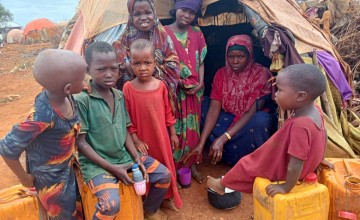
A journey to survive
More than 3.8 million people in Somalia are internally displaced, forced from their homes by a lethal combination of climate change and chronic conflict. The people of rural Somalia, heavily dependent on farming and livestock for survival, are suffering the increased frequency of extreme weather events.
For those surviving drought, the cruel relief is flash flooding, washing away the meagre assets of people already on the brink.
Over 312,000 Somalians were displaced by drought in the first four months of 2023, and over 408,000 were displaced by flooding.
Leaving behind their failed crops and dead livestock, they travel to IDP camps, congregating in the hope of finding food and water.
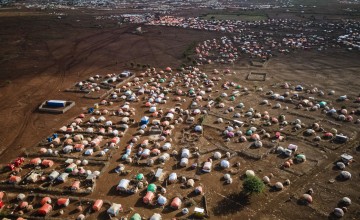
"The drought destroyed our income; we couldn’t even afford to pay for our transport fare. We could not have reached Baidoa without the support of relatives who paid for our travel expenses.’’
After arriving in Baidoa camp, Aqila found work cleaning houses and washing clothes for families living in a nearby town. The work was exhausting, infrequent, and poorly paid. She was struggling to feed her family. Her daughter, Hawo, became malnourished.
For Aqila, travelling to Baidoa was a chance for her children to survive. Now the fate of her daughter was hanging in the balance.
The Somali Cash Consortium
In January 2023, the Concern Worldwide team arrived in Baidoa. Their mission was simple in concept: To provide cash to those in greatest need. With this cash, families could meet their basic needs, and invest in their future.
Over 50 years of on-the-ground humanitarian work, and extensive academic research, has informed Concern’s understanding that directly giving cash is an effective way to support people experiencing a crisis or disaster. If there are functioning markets within reach, cash provides a family the opportunity and agency to meet their self-assessed needs.
In 2022, the Somali Cash Consortium - led by Concern, and funded by the European Union - reached close to 430,000 people with life-saving cash transfers worth over €8,500,000.
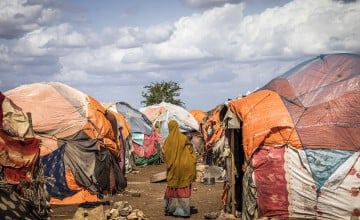
"Now, we afford three meals in a day"
When the Concern team in Baidoa met with Aqila, they identified that Hawo was malnourished, and quickly registered Aqila for a series of cash payments over three months.
When the first payment arrived, she immediately went to the market and bought vegetables, rice, sugar, wheat flour and cooking oil. She also bought beds and mattresses, improving their living conditions.
“I wanted to make sure to feed my children three times a day, and with a balanced diet.”
For Hawo, the cash was life-saving. “I am delighted with her progress,” says Aqila, smiling. “She is now eating well, sleeping well, and has started standing up.”
The cash assistance totalling 120 USD over three months, was enough for Aqila to save money also. With her savings, Aqila opened a small shop, selling basic items like sweets, biscuits, sugar, and milk.
“Now, we afford three meals in a day. The cash has helped my family in the most trying times.”
